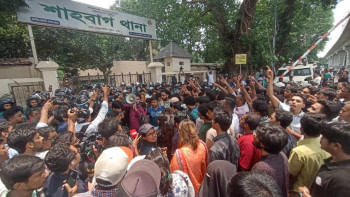UK’s GSP will continue after LDC graduation

The UK yesterday reaffirmed its commitment to continue the Generalised System of Preferences for Bangladesh even after its graduation to a developing country from a least developed one.
The reassurance came at the first meeting of the UK-Bangladesh Trade and Investment Dialogue at the commerce ministry in Dhaka yesterday, Md Jafar Uddin, secretary at the ministry, told The Daily Star over phone.
The UK, like the European Union, will continue the GSP for Bangladesh under the Everything But Arms (EBA) scheme.
The EU has said it will provide Bangladesh with the GSP facility up to 2027 so that the country can prepare to face new economic challenges after the graduation.
The UK is the third largest export destination of Bangladesh which ships goods worth nearly $4 billion to the European country every year.
The UK has started negotiations with its trade partners, including Bangladesh, all over the world as it has left the EU. After a lengthy negotiation, the Brexit came into effect last month.
Jafar said the UK has shown interest to invest in higher education in Bangladesh.
However, British High Commissioner to Bangladesh Robert Chatterton Dickson did not elaborate on it at the meeting, the secretary told this newspaper.
"We have started dialogue with the UK like that of Trade and Investment Forum Agreement (TICFA) signed between Bangladesh and the USA for resolving issues of trade and commerce through consultations between the two countries," Jafar mentioned.
At the meeting, Jafar urged the British government to recruit more doctors, nurses, engineers and teachers in the service sector as the demand for such professionals is high in the UK.
The commerce ministry issued a joint statement saying the UK and Bangladesh agreed to develop a future trade partnership that will enhance mutual prosperity and further Bangladesh's economic development as it graduates from Least Developed Country (LDC) status.
Both countries agreed to improve trade relationship through a mutual commitment to private sector-led growth, encouraging investment, and addressing barriers to trade faced by their companies in exporting goods and services.
The UK and Bangladesh discussed cooperation in areas such as investment, access of Bangladeshi professionals to UK service sectors, trade facilitation, ease of doing business, financial sector development, higher education, taxation and intellectual property protection.
In the statement, the British high commissioner said, "The UK is committed to working with Bangladesh to create a trade and investment relationship that helps both of our economies grow. Foreign Investment can provide jobs, transfer skills and generate revenue. A conducive business environment and removal of market access barriers can benefit both countries."

 For all latest news, follow The Daily Star's Google News channel.
For all latest news, follow The Daily Star's Google News channel. 



Comments